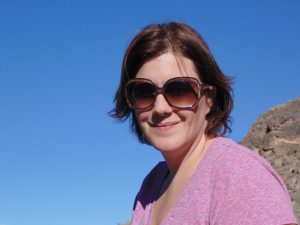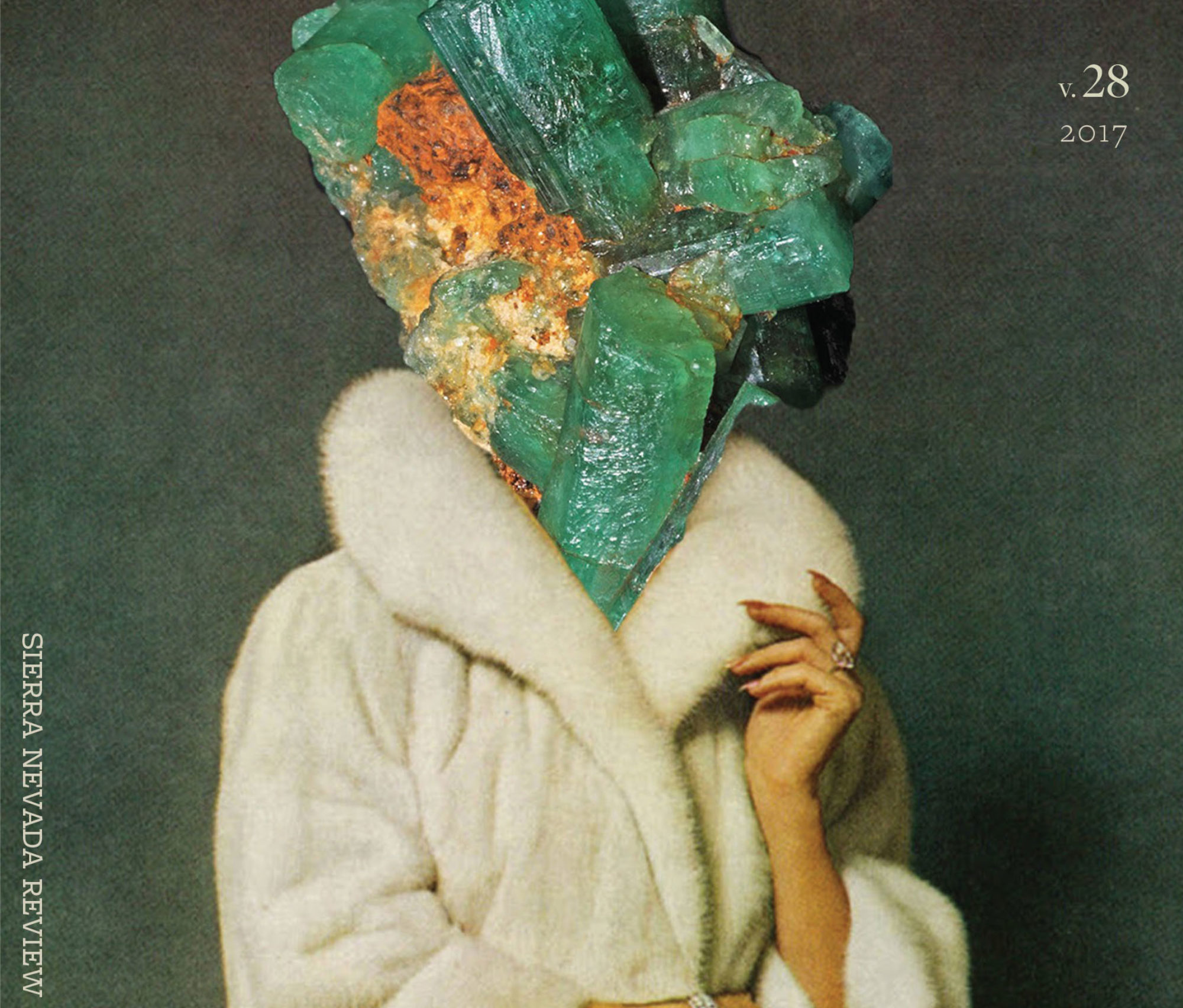I asked SNR contributor and MFA grad Courtney Harler about her writing, and found myself immersed in a discussion about the seemingly endless duality writers experience between the outside world and the worlds we contain within.
Wendy Hill: First off, congratulations on your recent Pushcart nomination for “Wild Turkeys,” which appeared in The Vignette Review. You recently completed your MFA in fiction and accepted a position with Chicago Literati. Can you talk a bit about your path as a writer? When did you first know you wanted to write and what has that impulse looked like throughout your life? How has it evolved and/or remained the same?
Courtney Harler: I always knew I wanted to write, but I spent the first thirty-five years of my life denying that urge. I grew up in a somewhat unstable environment, emotionally and financially, and as those two insecurities fed off one another, I suspect I felt compelled to make a more “practical” career choice. I studied business management for my undergraduate degree, then worked in information technology. A dozen years later, I returned to graduate school for English Literature. Even then, I thought of myself as more of a reader than a writer.
In 2013, I finally found the courage to pursue my writing in earnest. I took a few classes and started to work up a portfolio of short stories for graduate applications. I remember the day Brian Turner called to offer me a spot in the Sierra Nevada College MFA Program. I was at the vet with the new kitten, and I answered the unknown number out of perverse curiosity. Turns out, what with the dogs barking and the cats hissing, Brian and I couldn’t hear each other very well—but I discerned the word “welcome,” and I’ve felt such in this tribe of artists ever since. The SNC MFA was exactly where I needed to be to learn and grow as a writer. The work’s never done, of course, but I have a path now, and no more excuses.
WH: Before receiving your MFA from Sierra Nevada College, you earned an MA from Eastern Washington University. Your thesis from that degree was about Chris Cleave’s novel Little Bee. You argued that Cleave presented a literary exploration of the Nigerian spirit child, a child who is born to die, in order to explore political and post-colonial questions. You work with themes similar to the idea of the spirit child in your fiction, what are the larger ideas and undercurrents you are interested in exploring?
CH: I’m not sure Cleave agrees with my theoretical assessment of Little Bee, but nevertheless, his eponymous character, and the cosmological concept itself, haunted me throughout my first years as a graduate student. Many of my own stories feature a child who is lost, as well as a mother who loses herself to that irrevocable loss. The Nigerian spirit-child is caught in an endless cycle of birth and death; the mother also is suspended in that hopelessness. But—the loss itself has power and beauty too, something undeniably redemptive, in the way a mother can honor a lost child with her grief, her memories, her work.
WH: Many of your stories are set in rural communities, and the settings in your work are vivid. Can you talk a little bit about place in your own life, and the role setting plays in your work?
CH: I’ve lived too many places to enumerate here, but I identify most with open, undeveloped spaces. I grew up in Kentucky, roaming the hills, though I wasn’t born there. When I moved there as a young girl, I learned to observe rural life as an outsider, an interloper, and I think that’s why “country” settings resonate with me—I’m forever trying to parse that world. The geographical and cultural landscapes of my childhood still inspire and confound me.
For my work, setting simultaneously anchors and unsettles both my characters and my readers. I’m not always successful, but I like to approach setting as a fully dynamic element. At first, the setting might be knowable, but it must eventually present its own challenges. I’m not suggesting the theme of “human versus nature” here, though that arc is compelling. Instead, what I hope to achieve in my work is a more fluid—yet ever more fraught—exchange between setting and character. I think both comfort and conflict are inherent in that kind of “natural” relationship.
WH: That’s an interesting point. Comfort and conflict are inherent in a lot of formative relationships: parents and children, siblings. Place often functions in our lives like a formative relationship; it is one of the things that makes us. Where a person is from, or sometimes where a person is, is usually something we run from or something we want to carry with us. In “Lies & Mash”, how do you see this dynamic working for Shelby?
CH: Shelby loves the purity of the natural world in which she lives—the trees, the crick, the corn. However, she also feels confined by its societal circumstances—her role in her family, work, and religion—which result in an oppressive sense of isolation. In short, Kay makes young Shelby realize that their ways in the backwoods are backwards, unenlightened. Shelby, unable to accept such a view, vilifies Kay as an outsider for her “lies,” which are actually unadorned truths gained from more urban life experiences. Knowing she’ll never leave moonshine country, Shelby then takes what she can from Kay—the gift of the child, a symbol of both continuity and progress—but can never admit her own desire to explore the outside world herself. Shelby draws her solace from the child, tries to ease her own guilt by repeating Kays “lies” as truths; isolated as they are in this rural setting, the truth becomes a story in itself.
WH: Your work focuses on family relationships, birth, death, loneliness, animals— the themes of rural life particularly—and many of your characters/narrators are in the world at an odd angle. When themes recur in an author’s work, it usually points to their particular areas of interests, or even obsessions, the ideas they can’t let go of that inform their art. What is your personal connection with these themes and how do you see the ideas you can’t let go of informing your fiction?
CH: I like that particular phrase, “in the world at an odd angle,” which makes me think of Emily Dickinson: “Tell all the truth but tell it slant.” I feel like I do approach these themes on the diagonal—I try to cut through, or make sense, of these traumatic life events. And I’m always alone in that process, but I’m also never alone in that process. As I struggle, I can’t ignore the memories or the people who make those memories, not to mention the other writers who give me the courage to sit with myself. I do often write from personal experience, but I can’t call it “truth,” even as I hope for authenticity. The most I can call it is “slant,” because time—past, present, and future—overlays retrospective emotions and their changing lenses. On top of it all, or at the bottom of it all, I usually find guilt, which is a powerful motivator. Regret is different, softer, while guilt strives. Perhaps I am obsessed with my own culpability, and I turn that guilt into story to make amends. “Lies & Mash” is ninety nine percent fiction, though that autobiographical one percent (of guilt, of course) is the truest seed of the story.
WH: Most of your stories are told in the first person, a very intimate point of view. Is this choice connected with your exploration of guilt?
CH: When I first began to write fiction, and “Lies & Mash” is one of my first “official” short stories, the first person point of view afforded me the easiest entry into the protagonist’s innermost motivations. Using “I” allowed me, as the writer, to forge an immediate empathetic connection with the narrator by tapping into my own struggles with guilt. Yet, Shelby’s guilt ultimately became problematic for me. As a young girl, how culpable can she be? As she matures into adulthood, can we understand her motives on a different level? During revision, I also began to see how first person point of view can lend itself to unreliability, and then I began to more fruitfully explore the relative nature of truth/lies within the context of the story’s arc. I’m curious to know how readers interpret Shelby’s guilt. Does she “deserve” the privilege of mothering Amber Lou? I don’t know.
WH: What are your pet peeves as a reader, the things that will make you put down a book immediately? Do you have a least favorite book?
CH: I’m too stubborn to put down most books. If a book is poorly written, my temperament requires me to follow through, even if I have to speed read to get it done. Also, I teach writing, so I’ve trained myself to be a patient, generous reader. Sometimes what a writer is trying to convey isn’t exactly evident on the page, but I can intuit a certain intent. If that intuition bears fruit in the end, I might find value in a book that initially didn’t interest or impress me. That I recall, I’ve only put down two serious books in my life—Ulysses by James Joyce and The Prague Cemetery by Umberto Eco—and only because my obligations at the time prevented me from giving the book its due. Those two books are still on my list. Like I said, stubborn.
WH: Can you tell us about the projects you have in the works?
CH: I’m working on two books of fiction. The first is a collection of short stories, set mostly in rural areas. The collection began as my master’s thesis, and it still needs a lot of revision, and maybe some newer, fresher stories, too. The second is a novel-in-stories based on the life of a woman born into a religious cult. I’ll be traveling to New York and Sicily for research on that book. In between these projects I write a lot of flash fiction, typically when something in daily life deeply disturbs or interests me.
For nonfiction projects, I write book and film reviews. Lately, I’ve been working on a personal essay about a body-positive burlesque show. It’s exciting to branch out into these new creative areas, but I confess, I’m always thinking about how to fictionalize real-world experiences. I consider everything I read, witness, observe, or learn as fodder for future fiction.
 Courtney Harler writes and teaches in Las Vegas. Her work has appeared in Northwest Boulevard, Neon Dreams, The Vignette Review, Blue Monday Review, Chicago Literati, From the Depths, The Normal School, The Wild Word, and Ghost Parachute. More of her work is forthcoming soon in Palaver, Far Off Places, Tittynope Zine, and Tiferet. Most recently, Courtney’s short story “Cracked” was published in Legs of Tumbleweeds, Wings of Lace: An Anthology of Literature by Nevada Women.
Courtney Harler writes and teaches in Las Vegas. Her work has appeared in Northwest Boulevard, Neon Dreams, The Vignette Review, Blue Monday Review, Chicago Literati, From the Depths, The Normal School, The Wild Word, and Ghost Parachute. More of her work is forthcoming soon in Palaver, Far Off Places, Tittynope Zine, and Tiferet. Most recently, Courtney’s short story “Cracked” was published in Legs of Tumbleweeds, Wings of Lace: An Anthology of Literature by Nevada Women.
